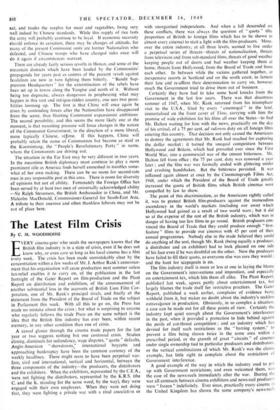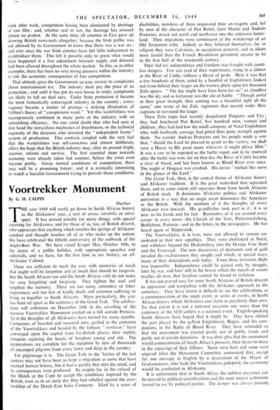The Latest Film Crisis
By C. M. WOODHOUSE
A casual glance through the cinema trade papers for the last year or two suggests nothing but one continual crisis. Studios closing, dismissals for redundancy, wage disputes, " quota " defaults, Anglo-American " showdowns," international boycotts and approaching bankruptcy have been the common currency of the weekly headlines. There might seem to have been perpetual war- fare, civil and international, vertical and horizontal, between the three components of the industry—the producers, the distributors and the exhibitors. When the exhibitors, represented by the C.E.A., were not fighting the distributors, represented by the K.R.S. (the C. and the K. standing for the same word, by the way), they were engaged with their own employees. When they were not doing that, they were fighting a private war with a rival associatian or
with unorganised independents.. And when a lull descended on these conflicts, there was always the question of " quota " (the proportion of British to foreign films which has to be shown in almost every cinema) to start a fight with the film-producers. More- over the entire industry, at all three levels, seemed to live under a perpetual series of threats—threats of nationalisation, threats from television and from sub-standard films, threats of good weather keeping people out of doors and bad weather keeping them at home, threats from Hollywood, from the Board of Trade and from each other. In between while the victims gathered together, at inexpensive resorts in Scotland and on the south coast, to lament their fate and re-affirm their determination to carry on, however much the Government tried to drive them out of business. ,
Certainly they have had to take some hard knocks from the Government in the last few years. There was that disastrous summer of 1947, when Mr. Rank returned from his triumphant visit to the U.S.A , feted by every " cinemogul " in the land, immortalised on the front cover of Time, carrying with him the promise of wide exhibition for his films all over the States—to find Mr. Dalton waiting for him with the news, practically on the day of his arrival, of a 75 per cent. ad valorem duty on all foreign films entering this country. That decision not only caused the Americans to destroy the agreements that Mr. Rank had reached for capturing the dollar market ; it turned the unequal competition between Hollywood and Britain, which had prevailed ever since the First World War, into a commercial war of the utmost bitterness. Mr. Dalton fell from office : the 75 per cent. duty was removed a year later ; and the film war was formally ended with glittering smiles and crushing handshakes. But the bitterness persisted. It was inflamed again almost at once by the Cinematograph Films Act, 1948, under which the President of the Board of Trade greatly increased the quota of British films which British cinemas were compelled by law to show.
The point of this discrimination, as the Americans rightly called it. was to protect British film-producers against the tremendous ascendancy in the world's markets (including our own) which Hollywood had gained as a result of two world wars ; but it did so at the expense of the rest of the British industry, which was in danger of having too few films to go round. British producers con- vinced the Board of Trade that they could produce enough " first- feature " films to provide our cinemas with 45 per cent of their annual programmes. Nobody else in the trade believed they could do anything of the sort, though Mr. Rank (being equally a producer, a distributor and an exhibitor) had to look pleased on one side of his face even if he was doubtful on the other. Now the producers have failed to fill their quota, as everyone else was sure they would ; and the hunt for scapegoats is on.
The film industry itself is more or less at one in laying the blame on the Government's interventions and imposition, and especially on entertainment tax, which hits them all alike. The Plant Report, published last week, agrees partly about entertainment tax, but largely blames the trade itself for restrictive practices. The Gater Report, published a week earlier, complains of evidence being withheld from it, but makes no doubt about the. industry's reckless extravagance in production. Obviously, in so complex a situation, a case can be made out for all these points of view. Certainly the industry kept quiet enough about the Government's interference in the past, when it provided a protection to hide behind against the perils of cut-throat competition ; and an industry which has devised for itself such restrictions as the " barring system," to prevent a film being shown twice in the same area within a prescribed period, or the growth of great " circuits " of cinemas under single ownership tied to particular producers and distributors, or the vertical combinations of which Mr. Rank's was the classic example, has little right to complain about the restrictions of Government interference.
A good example of the way in which the industry used to put up with Government restrictions, and even welcomed them, was the case of the news-reels immediately after the war. During the war all contracts between cinema exhibitors and news-reel producers were " frozen " indefinitely. Ever since, practically every cinema In the United Kingdom has shown the same company's news-reels week after week, competition having been eliminated by shortage of raw film ; and, whether real or not, the shortage has aroused almost no protest. At the same time, all cinemas in Eire gave up showing British news-reels altogether, because the Irish public was not allowed by its Government to know that there was a war on ; and ever since the war Irish cinemas have felt little inducement to re-introduce them. This left it possible only to guess what would have happened if a free adjustment between supply and demand had been allowed throughout the whole market. In this, as in other examples, there has been no very strong pressure, within the industry to risk the economic consequences of free competition.
That attitude gives the Government an easy answer to complaints about entertainment tax. The industry must pay the price of its protection ; and until it has put its own house in order, complaints are likely to fall on deaf ears. Under State protection it became the most fantastically extravagant industry in the country ; extra- vagance became a matter of prestige—a striking illustration of Veblen's theory of " conspicuous waste." Yet this wastefulness was incongruously combined in many parts of the industry with an astonishing efficiency. No one could doubt that who had seen at first hand the miraculous mechanics of distribution, or the technical ingenuity of the directors who invented the " independent frame " system of production. This contrast, coupled with the very fact that the wastefulness was self-conscious and almost deliberate, offers the hope that the British industry may, after its present fright, recover, reform and survive. The first essential steps towards economy were already taken last summer, before the crisis even became public. Given normal conditions of competition, there may well be a promising future ; and it is ironically interesting to watch a Socialist Government trying to provide those conditions.



































 Previous page
Previous page